
Mr. Deeds Goes to Town is a 1936 American comedy-drama romance film directed by Frank Capra and starring Gary Cooper and Jean Arthur in her first featured role. Based on the 1935 short story "Opera Hat" by Clarence Budington Kelland, which appeared in serial form in The American Magazine, the screenplay was written by Robert Riskin in his fifth collaboration with Frank Capra.

Jean Arthur was an American Broadway and film actress whose career began in silent films in the early 1920s and lasted until the early 1950s.

Peggy Sue Got Married is a 1986 American fantasy comedy-drama film directed by Francis Ford Coppola starring Kathleen Turner as a woman on the verge of a divorce, who finds herself transported back to the days of her senior year in high school in 1960. The film was written by husband-and-wife team Jerry Leichtling and Arlene Sarner.
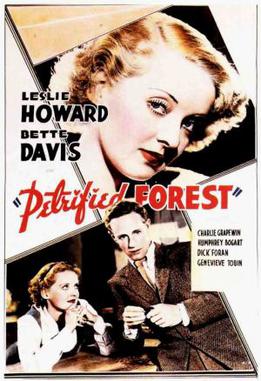
The Petrified Forest is a 1936 American crime drama film directed by Archie Mayo and based on Robert E. Sherwood's 1934 drama of the same name. The motion picture stars Leslie Howard, Bette Davis and Humphrey Bogart. The screenplay was written by Delmer Daves and Charles Kenyon, and adaptations were later performed on radio and television. The film is set in Petrified Forest National Park in Arizona.

Hero is a 1992 American comedy-drama film directed by Stephen Frears. It was written by David Webb Peoples, from a story written by Peoples, Laura Ziskin and Alvin Sargent, and stars Dustin Hoffman, Geena Davis, Andy García and Joan Cusack. Following the critically acclaimed The Grifters (1990), it was the second American feature film by British filmmaker Frears.

Frieda Inescort was a Scottish actress best known for creating the role of Sorel Bliss in Noël Coward's play Hay Fever on Broadway. She also played the shingled lady in John Galsworthy's 1927 Broadway production Escape and Caroline Bingley in the 1940 film of Jane Austen's Pride and Prejudice.

Pocketful of Miracles is a 1961 American comedy film starring Glenn Ford and Bette Davis, produced and directed by Frank Capra, filmed in Panavision. The screenplay by Hal Kanter and Harry Tugend was based on Robert Riskin's screenplay for the 1933 film Lady for a Day, which was adapted from the 1929 Damon Runyon short story "Madame La Gimp". That original 1933 film was also directed by Capra—one of two films that he originally directed and later remade, the other being Broadway Bill (1934) and its remake Riding High (1950).
Kathryn Jane Cook is a former elite athlete, specialising in sprint and sprint relays. She is one of the most successful female sprinters in British athletics history. She is three-times an Olympic bronze medallist, including at 400 metres in Los Angeles 1984. Her other individual achievements include winning the 200m at the 1981 Universiade, finishing second in the 100m at the 1981 World Cup, and winning a bronze medal in the 200m at the 1983 World Championships. She is also three-times a winner of the British Athletics Writers' Association Female Athlete of the Year Award (1980–82).
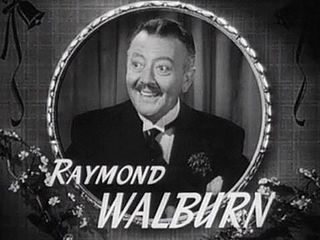
Raymond Walburn was an American character actor of stage and screen who appeared in dozens of Hollywood movie comedies and an occasional dramatic role during the 1930s and 1940s.

For the Love of Mike is a 1927 American silent romantic drama film. Directed by Frank Capra, it starred Claudette Colbert and Ben Lyon. It is now considered to be a lost film.

You Belong to Me is a 1941 American romantic comedy film produced and directed by Wesley Ruggles and starring Barbara Stanwyck and Henry Fonda. Based on a story by Dalton Trumbo, and written by Claude Binyon, the film is about a wealthy man who meets and falls in love with a beautiful doctor while on a ski trip. After a courtship complicated by his hypochondria, she agrees to marry him on the condition that she continue to practice medicine. His jealousy at the thought of her seeing male patients, however, soon threatens their marriage. The film was released in the United Kingdom as Good Morning, Doctor, and was remade as Emergency Wedding in 1950.
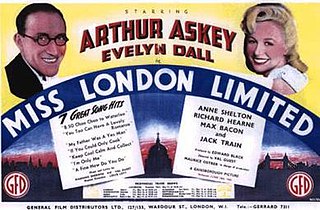
Miss London Ltd. is a 1943 British, black-and-white, comedy, musical, war film, directed by Val Guest and starring Arthur Askey and Evelyn Dall. It was produced by Edward Black, Maurice Ostrer, Fred Gunn and Gainsborough Pictures. It was Guest's directorial debut.

The Wife Takes a Flyer is a 1942 romantic comedy film made by Columbia Pictures, directed by Richard Wallace. The film stars Joan Bennett and Franchot Tone. The screenplay of The Wife Takes a Flyer was written by Jay Dratler, Gina Kaus and Harry Segall. The film's music score is by Werner R. Heymann.
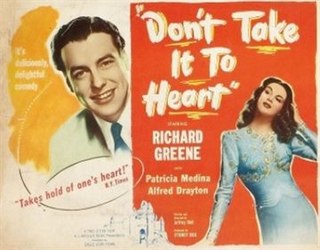
Don't Take It to Heart is a 1944 British comedy film directed by Jeffrey Dell and starring Richard Greene, Alfred Drayton, Patricia Medina, Moore Marriott and Richard Bird.

Call It a Day is a 1937 American comedy film directed by Archie Mayo and starring Olivia de Havilland, Ian Hunter, Anita Louise, Alice Brady, Roland Young, and Frieda Inescort. Based on the 1935 play Call It a Day by Dodie Smith, the film is about a day in the life of a middle-class London family whose lives are complicated by the first romantic signs of spring.

The King Steps Out is a 1936 American musical comedy film directed by Josef von Sternberg and starring Grace Moore, Franchot Tone and Walter Connolly. It is based on the early years of Empress Elisabeth of Austria, known as "Sisi" or "Sissi", and her courtship and marriage to Franz Joseph I of Austria, after he was initially engaged to her older sister Duchess Helene in Bavaria. The film is set from 1852 to 1854.
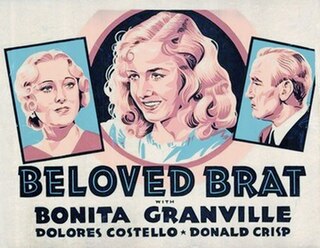
The Beloved Brat is a 1938 American comedy-drama film directed by Arthur Lubin and starring Bonita Granville, Dolores Costello, and Donald Crisp. The screenplay was written by Lawrence Kimble from an original story by Jean Negulesco.
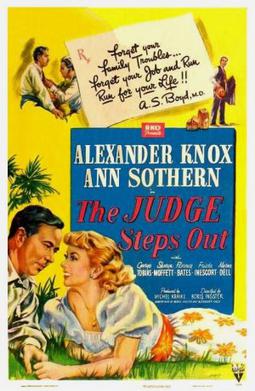
The Judge Steps Out is a 1948 American comedy film directed by Boris Ingster and written by Ingster and Alexander Knox. The film stars Knox and Ann Sothern, along with George Tobias, Sharyn Moffett, Florence Bates, Frieda Inescort and Myrna Dell. The film was completed in March 1947, but its American release was held up until June 2, 1949, by RKO Pictures. The film was retitled Indian Summer in Great Britain and the Commonwealth.
A Wonderful Life is a 1951 black-and-white short drama film produced by the National Council of Churches of Christ and distributed by the Protestant Film Commission. It is an adaptation of Frank Capra's 1946 film It's a Wonderful Life for the Christian film industry. Directed by William Beaudine, it stars James Dunn, Allene Roberts, and Arthur Shields. The film retells the life of an ordinary Christian family man in flashback as his family and friends remember all the good he did through his devotion to church and community. The film emphasizes the power of faith, love, and community service for living a meaningful life, together with the message that people do not realize the true worth of others until after they have died. The film was not released commercially, but was distributed to some 30,000 churches throughout the United States and Canada.
Alfred Romaine Callender, more commonly referred to as Romaine Callender and also known professionally as A. Romaine Callendar and Alfred Callender was an English born American actor of stage and screen. He should not be confused with several other men in his family also known publicly as Romaine Callendar, including his father, the stage actor Edwin Romaine Callendar (1845-1922), and his uncle, the music educator, conductor, composer, organ builder, and book author William Romaine Callendar (1859-1930).

















